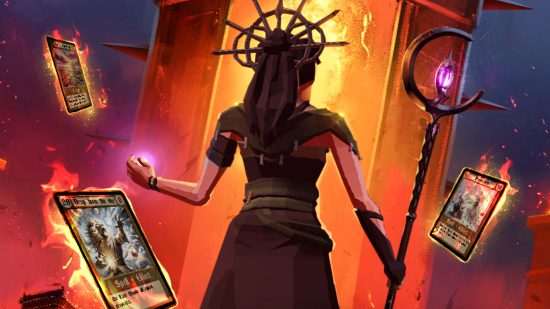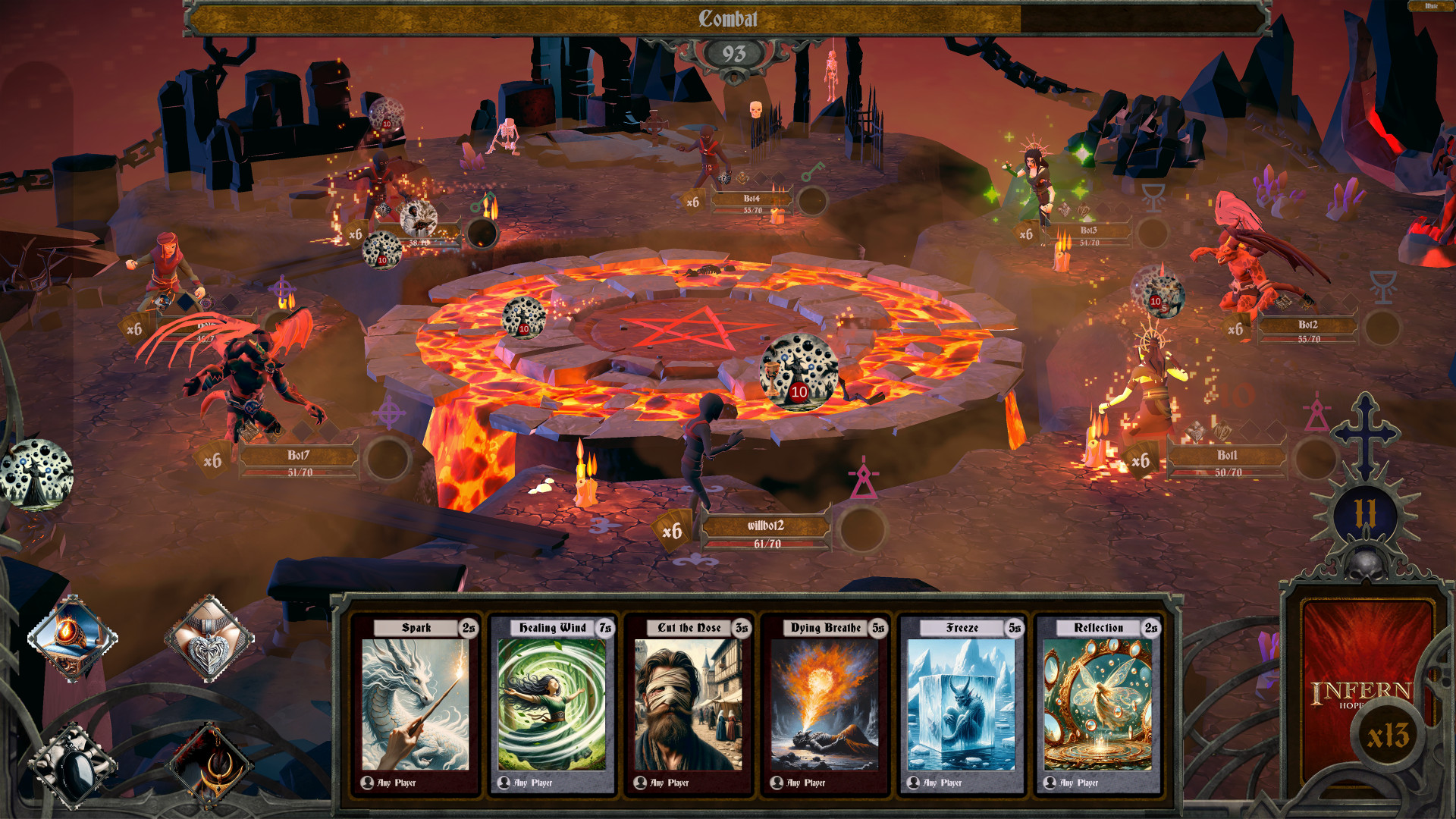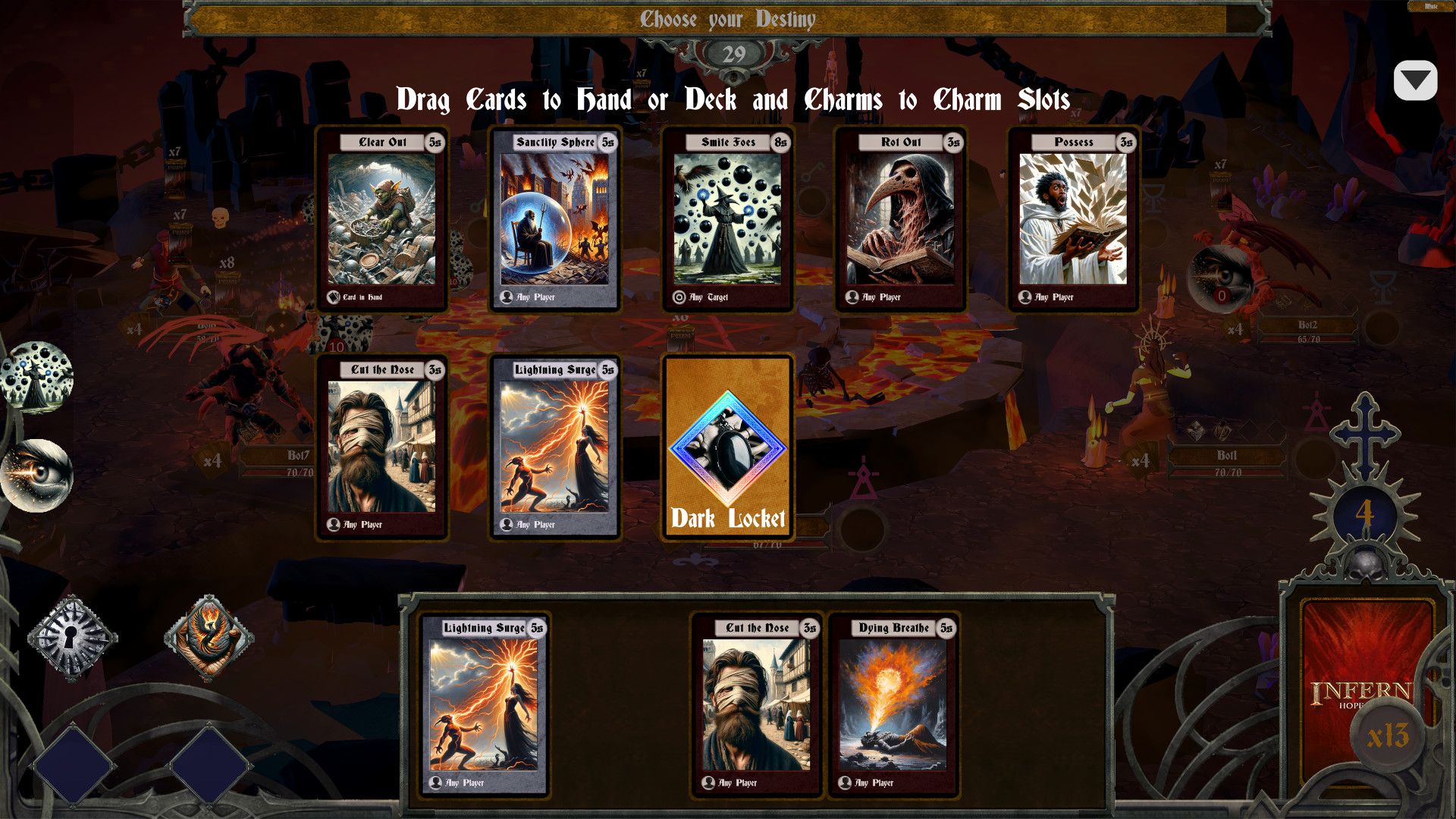Magic the Gathering was a staple of my university house, and we’d often crowd for multiplayer showdowns using decks built of old cards salvaged from a friend’s extensive collection. While MTG Arena and the likes of Hearthstone are great digital spins on collectible card games, new deckbuilding battle royale game Inferni Hope and Fear aims to capture that old-school spirit and transform it into something new and exciting. Inferni playtests are ongoing on Steam, and we at PCGamesN spoke to lead designer Will Luton at WASD 24 about the project.
Billed as the “world’s first battle royale deck builder,” Inferni: Hope and Fear is a competitive multiplayer game that Luton calls “a love letter to ‘90s Magic the Gathering.” He also takes inspiration from roguelikes and battle royales, citing Tetris 99, Slay the Spire, and Vampire Survivors as some of his key influences, all to help craft this unique card battler that plays out as an intense real-time tactical showdown between eight players sitting around the virtual table, paired into four teams.
The core of Inferni is that you, your partner, and your opponents all face each other in a circle, and use an increasing supply of black and white mana to cast spells from your deck that then physically move across the arena towards your opponents. Black cards focus on dealing damage and harming your enemies in other ways; white cards are more defensive, canceling or redirecting incoming threats before they hit you. You’ll have to strike a careful balance, then, of firing out attacks at your rivals while ensuring as few dangers as possible make it to you.
Tetris 99 was the inspiration that really made the idea click of a battle royale game being more than just a shooter, Luton tells us. While PUBG was the game that most dramatically popularized the format, the multiplayer block-dropper was “an entirely fresh way” of bringing players together. Tetris 99’s idea of firing off attacks at other players is something Inferni also adopts, but the team felt that the high player count made things “very impersonal – so we pared it down to a smaller group.”
The unique format of Inferni isn’t intended to simply replicate a tabletop TCG like Magic, Luton emphasizes. The benefit of that is that you’re always actively playing in Inferni – you aren’t ever just sitting there waiting for your opponent to make a move. The UI is designed to be “very clean and minimal,” making sure that all your cards are easy to read at a glance in the middle of a fast-paced fight.
You’ll pick from a selection of characters when you sit down – the Demon Hunter is all about simple, all-out damage dealing, for example, while the Plague Doctor uses their own life as a resource, making use of healing abilities to sustain themselves. Other classes such as the Trickster Demon and Time Witch are more devious, disrupting or controlling the moves of other players.
Because of the eight-player nature of Inferni, battles take place in real time, which is a departure from the turn-based format used by the vast majority of card games. “This adds a really unique flavor to the game,” Luton remarks. “It brings a whole bunch of interesting design mechanics, but also a bunch of problems – you can’t wholesale take stuff that TCGs have done for the last 30 or 40 years.”
As the match progresses, three periodic card drafts will take place. You’ll be presented with a selection of cards to choose from, letting you expand your deck. You take one and then pass the rest of the pack onto the next player, meaning that while your primary focus is going to be honing your core strategy with synergistic cards, you’ll also want to keep an eye out for any potential match-winners that you might want to keep out of your opponent’s hands.
Luton says the depth and intricacy is a big part of the design – Inferni isn’t intended to be “casual and accessible,” he explains, but rather to offer a complex and satisfying toolset to encourage more deep strategic play. You’ll see some very powerful cards come into play: Growing Hate is a spell that gains damage as it travels across the battlefield, and will keep getting even bigger if it’s deflected at another player (or reflected back towards you) by its original target. Kill Shot, meanwhile, is a very slow-moving spell that costs a lot to cast, but if it successfully hits a player they’re dead; no questions asked.
“We’re always adding and removing and changing cards,” Luton tells us. “At the moment it’s around 50.” More than half of those will only show up over the course of the draft rounds, meaning those big match-enders aren’t going to be in play from the beginning of a match. “Part of the beauty of the game is understanding which cards are stronger and weaker, and in what context and what strategies – an ideal card is one where it has a multitude of uses but it’s easy to read.”
Luton tells us he hopes to see Inferni evolve for a long time to come – “Magic’s just hit 30 years,” he points out. In the future, the team has ideas for possible new mechanics such as pets, along with other modes such as a co-op PvE format where players battle against a stronger computer-controlled monster. For now, however, the focus is on the testing and then early access, which will begin with a “season zero.” Future seasons are planned to last around three months.
Inferni: Hope and Fear is coming soon on Steam – the next playtest is set to take place on Monday April 29 at 6am PT / 9am ET / 2pm BST / 3pm CEST. If you’re looking to take part, head to the game’s Steam store page to keep track of updates and add it to your wishlist if you want to be kept up to speed with future information and playtests.
We’ve got a winning hand of the best card games to keep you plenty busy in the meantime, along with all the best battle royale games if you’re looking to prove that you’re the best of the best. Our sister site Wargamer also has the MTG release schedule and all of the MTG sets in order, so do swing by.
You can also follow us on Google News for daily PC games news, reviews, and guides, or grab our PCGN deals tracker to net yourself some bargains.
Additional reporting by Nat Smith at WASD for PCGamesN.


